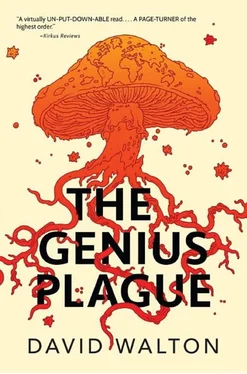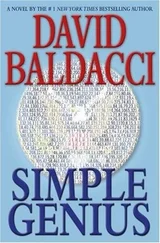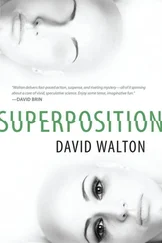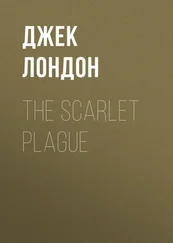The soldier who had spoken raised his weapon. “Should I shoot him?”
I raised my hands, trying to look nonthreatening. “I’m not one of his slaves, at least not yet,” I said. “But Barron is dropping spores on the base, and we were caught in it. A few hours from now, we’ll do whatever he tells us.”
“And you want us to abort the mission?” Paul asked. “You want to be a slave? If we leave now, Barron wins. It won’t stop with this battle. He’ll keep on making spores, and keep on using them to control people. He’ll destroy the Ligados wherever he finds us. Ultimately, his strain of the fungus will be the one that survives.”
“It will anyway,” I said. “Do you think dropping nukes on major cities will make people give up? They’ll just make more of McCarrick’s spores. They’ll keep on throwing slave armies against you, and they’ll use nukes right back at you. There are still a lot more people in the world than there are Ligados, and if you do this they’ll be desperate. The whole world will be against us.”
Paul laughed. He actually threw back his head and laughed loud enough for the sound to echo along the tunnel walls. Then he looked back at me incredulously and shook his head. “I forgot that you haven’t been connected,” he said. “You actually don’t know the plan, do you?”
I felt a hard knot in my stomach. “What do you mean?”
“The latest plan isn’t to drop nukes on major cities. That was discarded before I ever left Brazil.”
“Then what?”
“We’re going to detonate right here.”
I stared at him, finding it hard to process his words. “It… what? What good does it do to detonate a nuke in Albuquerque? Why conquer a city and then destroy it?”
“Not one nuke,” he said. “ All of them. We’re going to detonate all two thousand one hundred and eighty-three nuclear warheads stored in this underground complex, all at the same time.”
I looked around, the meaning of all of the wires finally registering in my brain. This branch of the tunnel was just as full of warheads as the first one had been, and at the end of it I could see yet another turn. A thick bundle of wires already stretched around the corner from that direction.
“But… that’s…” My mouth moved without forming words, my mind racing faster than my words could keep up. “That’s crazy,” I finally said. “That’s enough firepower to… to…”
“It’s over a billion kilotons,” Paul said matter-of-factly. “It’s enough to blow a crater in the New Mexico desert the size of New Hampshire.”
I understood at once. There had been past ages on Earth when fungi had been the dominant kingdom on the planet. The Ligados were trying to recreate such an age. An explosion like the one Paul described would blow enough radioactive debris into orbit to circle the globe and block sunlight for years. Plants would die. Animals would die. The human species would probably survive, but billions would die, and our technological infrastructure would be all but destroyed. We would become dependent on the fungus for everything.
“But… the Ligados have been converging here,” I objected weakly. “They’ll all die, too, along with us.”
“It’s never been about the people,” Paul said. “The people are disposable. In one move, we’ll eliminate human overpopulation and create a climate where we can never grow so numerous again. By the time the sun finally peeks through the dust clouds, it’ll be a new world. A world where Kingdom Fungi dominates the planet.”
I wanted to be horrified, but I wasn’t. The fungus in my mind prevented that. I could see the power of this plan, the reshaping of the world to the perfect environment for the fungus, at the same time taking out its major competitors for the use of the Earth’s resources.
“What about our glorious future as symbiotes with the fungus?” I asked. “The future you showed me in Brazil?”
“That will still come,” he said, a little sadly. “For some humans; the ones who survive. Just not for us.” He shrugged. “There are just too many of us. It was always only meant for a few.”
“But won’t this destroy the Amazon?” I asked. “All the trees, the animals, the whole ecology the fungus controls and grows in. They’ll die, too.”
“It was never about them either. They’re a means to an end, just like we are. This will turn the clock back, to a time when fungus ruled the Earth. Any species that can survive in that world will serve the fungus.”
A man in civilian dress, presumably the nuclear engineer, came up to Paul. He held a tablet in his hands, which he poked at with his thumbs, typing as he walked.
“We’re all set for remote detonation,” he said. “Everything is wired and status is green.”
“Remote?” Paul frowned. “Why remote? We’ll be just as dead upstairs as here. If it’s all wired, push the button.”
The engineer shook his head. “We have to control the timing precisely,” he said. “We want to create a rolling chain reaction so that each of the detonations increases the overall strength of the blast. The whole thing takes less than a millisecond, but if the controller is destroyed too soon, the timing will be off, and we won’t get nearly the megatonnage we expect. We might barely destroy the city.”
“Okay. But you’re ready?”
The engineer held up the tablet, which showed a simple status display along with a rectangular green button. “That’s all it takes.”
“Wait,” I said. “This is a high-risk plan. If the blast isn’t large enough, there will be a backlash. The rest of the world will unite to destroy us. Barron and others like him will have full rein. And if it’s too big—surely there’s a point at which not even the fungus can survive. Where the entire planet is sterilized of life. Is it really worth that risk?”
“We’ve modeled it,” Paul said. “Checked and rechecked the numbers. The range of error is pretty wide.”
“But…” I said, not knowing how I was going to finish the sentence. I could feel my resistance to the idea dissolving. Paul was a mycologist; he would know how much radiation the fungus could handle. I knew it was just the infection in my brain that made the death of billions seem like a good idea, but I had a hard time thinking of why it would be bad.
I wondered what Shaunessy thought about all of this, and realized that I hadn’t seen her since I’d turned the corner of the tunnel. Maybe she’d changed her mind about being down here after all and had gone back up the elevator. It was probably for the best. She might have resisted, and then the soldiers would have shot her. Better that she die cleanly and instantaneously, like all the rest.
“Back to the elevators,” Paul said to the group. “We need to go back up.”
I went with them dumbly, my resistance gone. I could only fight the idea if I had a better one, one that benefitted the fungus just as much, and I didn’t. I didn’t even feel sad. In fact, the more I thought about it, the more elated I felt. We were going to do it. As soon as we reached the top, the engineer would press the button on his tablet, and it would all be over in a moment. All of the rapacious greed of humanity swept away to make room for a saner, more balanced approach to life. I was only sorry I wouldn’t be there to see it.
The freight elevators were large, but not large enough to hold everyone. I rode with Paul and the engineer and about a dozen soldiers, while the other soldiers and civilians took another elevator. We rode up in silence, until I said, “Goodbye, Paul.” He turned, surprised, and regarded me. Then he nodded and ruffled my hair. “Goodbye, little brother.”
I thought of Shaunessy, and Melody, and Andrew, and the thousands of people in the city to our north. We would all die in an instant, like turning off a light. No pain, no fear, no prolonged anticipation. It was a good way to go. The push of a button, and a new chapter in the history of the Earth would begin.
Читать дальше












